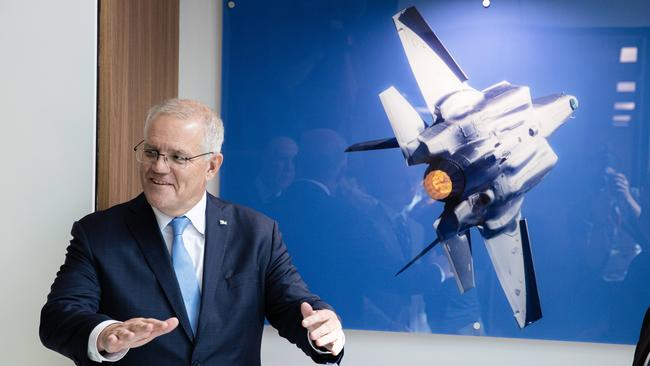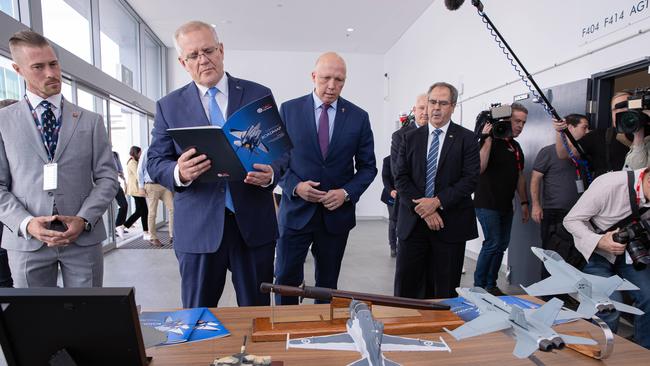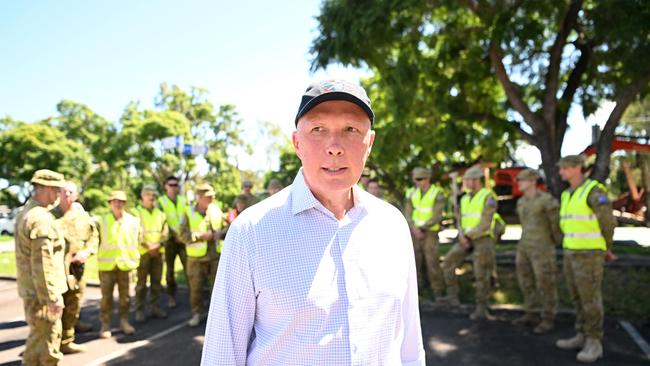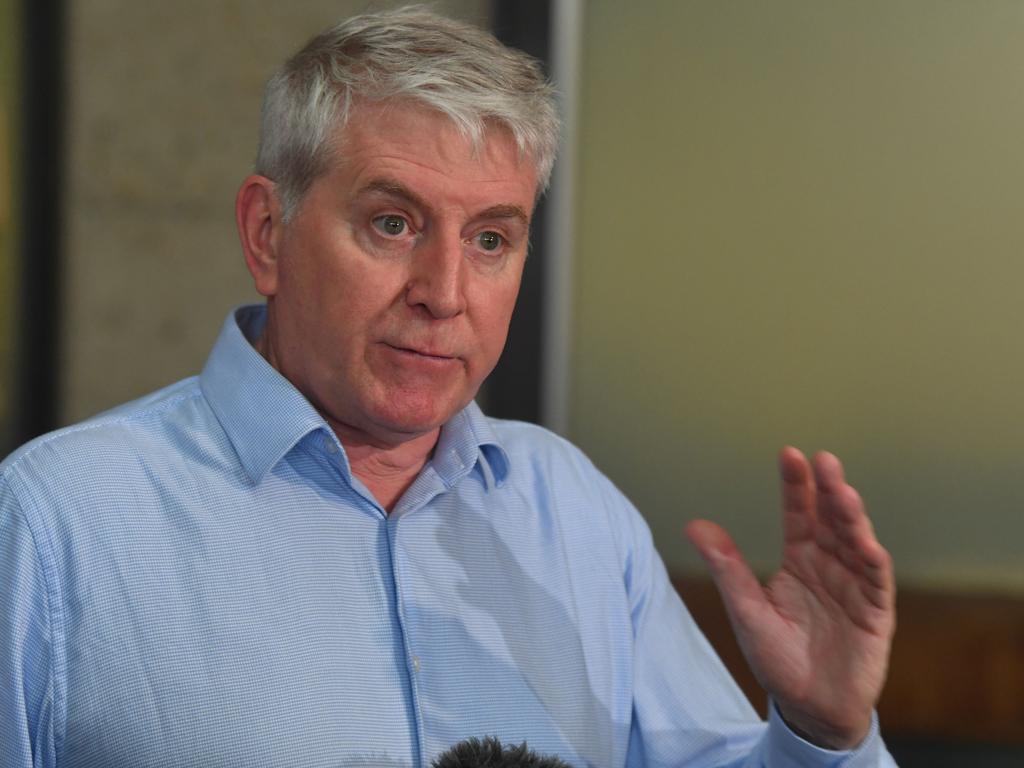Defence policy stranded in post-modern cul de sac as China and Russia tear up international order
Diplomatically, the Morrison government has responded to the China challenge effectively, brilliantly. Inexplicably, it has not responded militarily at all.

This is a defence campaign without defence policy or even debate. Instead there is a disconnected set of rhetorical flourishes from the government, greeted with wry scepticism from Labor, but neither side proposing actually to do anything.
As far as security goes, Australia is having its first, perfect, postmodern election: nothing exists beyond the images and slogans. There is no reality, only text and images.
The dominant election event is Solomon Islands and Beijing signing a security agreement in which the text is secret, but according to a leaked draft would allow Beijing to move in significant numbers of troops and police, establish port facilities for Chinese ship visits and longer deployments, and give Beijing a leading role in Solomons security, including the defence of infrastructure and of Chinese people, including, presumably, ethnic Chinese Solomon Islanders.
Scott Morrison said a Chinese naval base would cross a “red line” and we’re not having it. This is surely one of the most remarkable statements made by an Australian leader. Two types of countries issue red lines – very big, powerful countries that can enforce them, and very small, impotent nations that can only make gestures.
For Canberra to declare red lines around Chinese actions resembles Beijing declaring its zero-Covid policy. Rhetoric bears no relation to reality. It is performative symbolism. Anyone who dares reference reality in such contexts is the skunk at the party, as with Nationals senator Matt Canavan pointing out that the net-zero commitments of many nations are already falling apart and probably impossible anyway. Reality is such bad taste.
The worst feature of a postmodern campaign is it ignores the big reality out there. China and Russia are attempting to create a new world security order, of which Moscow’s invasion of Ukraine and Beijing’s security deal with Honiara are emblematic.

China’s President, Xi Jinping, made this explicit in his recent Boao Forum for Asia conference speech. His vision is bold and ambitious. He wants the liberal, rules-based order to give way, for the US alliance system to disappear with a new era of authoritarian, bilateral deal-making and regional hegemonic arrangements to take its place. Xi demanded an end to “Cold War mentality”, by which he means US alliances. He denounced “bloc confrontation”, for which read the Quadrilateral Security Dialogue and AUKUS, and condemned the “abuse of unilateral sanctions” – Western action against Russia. He wants consideration for the “legitimate security concerns of all countries”, which means accommodating Beijing and Moscow, their claims to regional spheres of influence and control over the nations previously ruled from their capitals, such as Ukraine and Taiwan
So far, China and Russia have not succeeded in displacing the international rules-based order, but they have created big zones where it doesn’t apply. The Beijing-Moscow order sits uneasily next to the bedraggled but surviving liberal, rules-based order. The two jostle each other in hostile competition the whole time.
John Lee, a former adviser to Julie Bishop, and an academic authority on Indo-Pacific geopolitics, argues that Beijing has substantially given up trying to wean modern democratic allies away from strategic alignment with the US. Instead it now makes its pitch to the global south, those less wealthy nations that feel globalisation is rigged in favour of the West. In this view, the West constantly displays double standards. Sanctions are just economic measures to deliver benefits to the West.
Living in an affluent democracy such as Australia, it’s easy to miss the widespread appeal these arguments have. Most nations condemned Russia’s brutal invasion of Ukraine. But some of the most important developing nations, especially India, refused to vote for the UN resolutions on Ukraine. Others, such as South Africa and Brazil, have no interest in supporting sanctions. In Vietnam, much of Africa, even Indonesia and India, internet opinion is remarkably sympathetic to the view that Moscow acts in the same way Western powers have always acted.

Much of the developing world public feels about globalisation and the liberal order as Marine Le Pen voters feel about Emmanuel Macron’s presidency – that it’s a con, rigged up to benefit the rich. They’re wrong, at least mostly wrong, but the feeling is widespread. Xi’s China offers developing country elites such as Honiara’s a different way to development – or, more crudely, to make money. Sign up to Beijing’s Belt and Road Initiative, or sign a security agreement, or take out a big Chinese loan, it doesn’t matter if the infrastructure is dodgy or much of the money disappears into personal bank accounts. You’ll get a quicker development boost, with less hectoring about human rights and governance, than if you go with the West.
Geremie Barme, our most brilliant contemporary Sinologist, points out Beijing in the past often painted itself as allying with the Third World against the West. He cites Zhou Enlai’s prominence at the 1955 Bandung conference, which fostered the Non-Aligned Movement. He also argues that Beijing’s alignment with Moscow is not surprising. It represents deep continuity in Chinese communism. Xi, Barme tells me, in 2017 made a seminal speech in which he remarked: “We are witnessing major changes unfolding in our world, something unseen in a century.” Xi has used the formulation more than 40 times. The historic change he was talking about was the 1917 Bolshevik revolution in Russia. As Mao Zedong frequently commented, the Bolsheviks gave the world Marxism-Leninism.
Xi has always been an intensely orthodox Chinese communist. This is a reality Western analysts have struggled with. Those trapped in the unreal swamps of so-called foreign policy realism cannot imagine that ideology affects state behaviour, while Pollyanna liberal internationalists cannot conceive of anyone believing anything other than liberalism.
The best assessments of Chinese global ambition come in the Pentagon’s assessment of the Chinese military last November and the US Indo-Pacific Strategy, published in February. The Pentagon assessment comments: “The People’s Republic of China is the only competitor capable of combining its economic, diplomatic, military and technological power to mount a sustained challenge to a stable and open international system. Beijing seeks to reshape the international order to better align with its authoritarian system and national interests.” The US Indo-Pacific strategy says: “The PRC pursues a sphere of influence in the Indo-Pacific and seeks to become the world’s most influential power … The PRC is also undermining human rights and international law.”

Foreign Minister Marise Payne made a good speech this week echoing the judgments of the two foundational US documents. However, she and all the government should pay close attention to the substance of the Pentagon report. It is sobering, R-rated stuff, not to be shared with those with a weak stomach. It recounts staggering Chinese military build-up. Despite China’s slowing economy its military budget expands by 7 per cent this year to $US230bn ($324bn). Much Chinese military spending falls outside the official defence budget. So Beijing’s real defence spend is much bigger even that this. It’s still less than half the US defence budget. But Beijing pays the two million personnel in its regular forces much less than the US pays its people. And the US provides elements of security across the globe. Beijing can focus on the Indo-Pacific.
China already has the world’s largest navy, bigger than the US navy though not yet as powerful. It is rapidly expanding its nuclear arsenal and will have 1000 warheads by 2030. It has switched to a launch-on-warning nuclear retaliation system. It has fused military and civilian technology, completely combined the industrial capacities of both sectors.
Increasingly Beijing sees the People’s Liberation Army – as the Chinese military is called – as central to its national development and foreign policy. The Pentagon document describes China’s ambition to establish logistics hubs – de facto naval bases – in countries around the world. China is hyperactive all across the military waterfront – aircraft carriers, hypersonic missiles, fifth-generation fighters, space capabilities, cyber war, the whole lot.
Authoritative US military leaders, as well as our own Defence Minister, Peter Dutton, have frequently said Beijing may launch a military operation to take Taiwan by force in the next five years or so. What, then, has Beijing learnt from Russia’s troubled experience in Ukraine? Maybe they’ve learnt that such invasions are unpredictable and dangerous, and that the West can rally to be more united than you’d think, that sanctions can be costly to bear.
But let’s take another historical example. Beijing was also undertaking some liberalisation of its own in the 1980s. But it saw Mikhail Gorbachev in the Soviet Union introduce perestroika – economic restructuring – and glasnost, political openness. The Soviet Union collapsed in the wake of these reforms. Beijing read this as a cautionary tale and cracked down instead, re-embracing Leninist authoritarianism.

In this case, it may learn these lessons: it will do techno-centric warfare much better than the Russians did, it will make any operation extremely fast so the West does not have time to mobilise, nuclear threats are effective, and sanctions finally are endurable. Oh, and this, after everything, Russia, with all its military incompetence, probably keeps a big chunk of Ukraine.
Barme points out that Xi and his generation are obsessed by taking back Taiwan. It is, in a sense, China’s Ukraine. “China dealt with most of its ‘Ukraines’ in the 1950s,” Barme says, “taking back Tibet and Xinjiang, territories illegally controlled by the empire it succeeded.”
But here is a question no one asks. What path does China embrace the day after it has conquered Taiwan? Without making predictions about such a hypothetical and complex scenario, Barme comments that empire is a polity that simply expands and continues to expand until it cannot expand any more.
Western policymakers who badly wanted to accommodate China used to argue that Taiwan was a legacy issue, a sovereignty issue, that Beijing would not have any more territorial ambitions once it “reunified” Taiwan. Truly?
Here are five things to bear in mind about the Chinese military. It is acquiring vast capabilities – hypersonic missiles, aircraft carriers – far beyond those it would ever need just for Taiwan. It already claims much more territory than Taiwan, such as the South China Sea, slabs of India and so on. Look at history – when has a militarised dictatorship ever been satisfied with one conquest? If it conquers Taiwan, the PLA navy and air force would have massively increased regional power projection capabilities. And finally, it would face a radically diminished US presence in the region. We don’t know what the limits of Chinese military expansionism may be.
Which brings us back to our postmodern, no-substance election campaign. The overwhelming priority for us should be to acquire robust, fierce, asymmetric capabilities that would make us a “hard Australia”, a porcupine, very dangerous to approach with hostility. But while both sides of politics have made defence announcements, neither has promised any new capability, any new weapons systems.
Many nations, from Germany to a slew of Europeans, even the US itself, have increased their defence spending. But we, though our government talks endlessly of unprecedented security dangers, spend less than 2 per cent of GDP on defence and remain on our long predesigned budget path with no new capabilities this decade.
Diplomatically, the Morrison government has responded to the China challenge effectively, brilliantly. Inexplicably, it has not responded militarily at all. Diplomatically, the government has the Quad and AUKUS, predominantly symbolic agreements but embodying hugely important symbolism.
But it’s astonishing that both sides of politics propose nothing on defence capabilities. We now face the prospect of a Chinese naval base 1700km northeast of Cairns yet have no plans to acquire armed drones, or many missiles, no interim subs before the nuclear-powered subs arrive in Star Trek time, or any of the countless asymmetric systems we could afford. Paul Dibb, in his seminal 1986 report, said 3 per cent of GDP was necessary to defend ourselves. Those were more benign times. Yet now we do less.
It’s as if the government has substituted the histrionics and theatre – the performative symbolism – of constantly denouncing Beijing for an actual defence policy. Statements instead of missiles, press releases in place of drones. It’s always ugly, and often violent, when postmodern conceits collide with reality. That may yet be Australia’s fate.








The weirdest thing about the Australian election is that it has been a khaki election with no khaki, a security and military-centred campaign in which the only thing missing is the military, or any policy regarding the military. Neither side of politics has proposed any new weapons system or any expansion in defence spending, which last year came in under 2 per cent of gross domestic product, despite the government boasting it had exceeded 2 per cent.